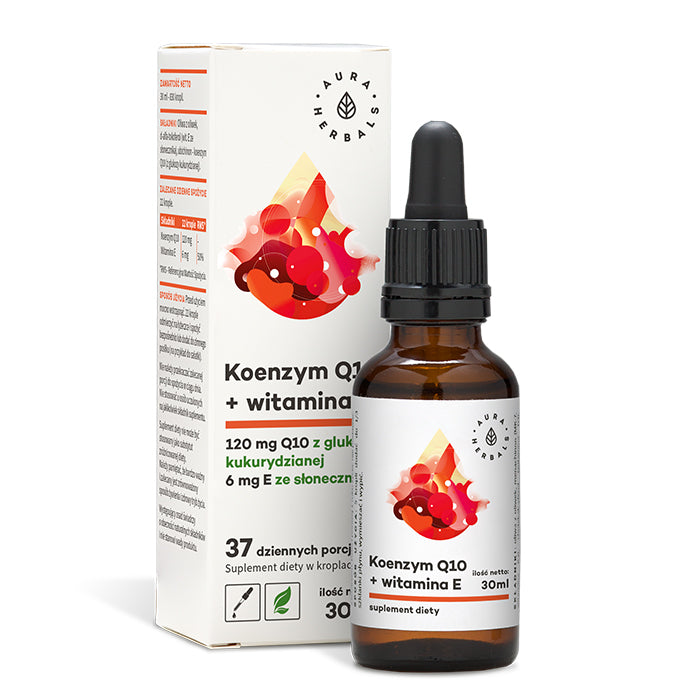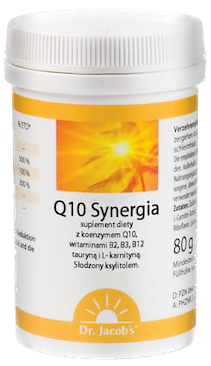Coenzyme Q10 - what it is, effects, contraindications
Coenzyme Q10 under a magnifying glass. Characteristics, types, action, excess, deficiency, dosage.


Learn more about our editorial process
.

Learn more about our editorial process
.

Learn more about our editorial process
.

Learn more about our editorial process
.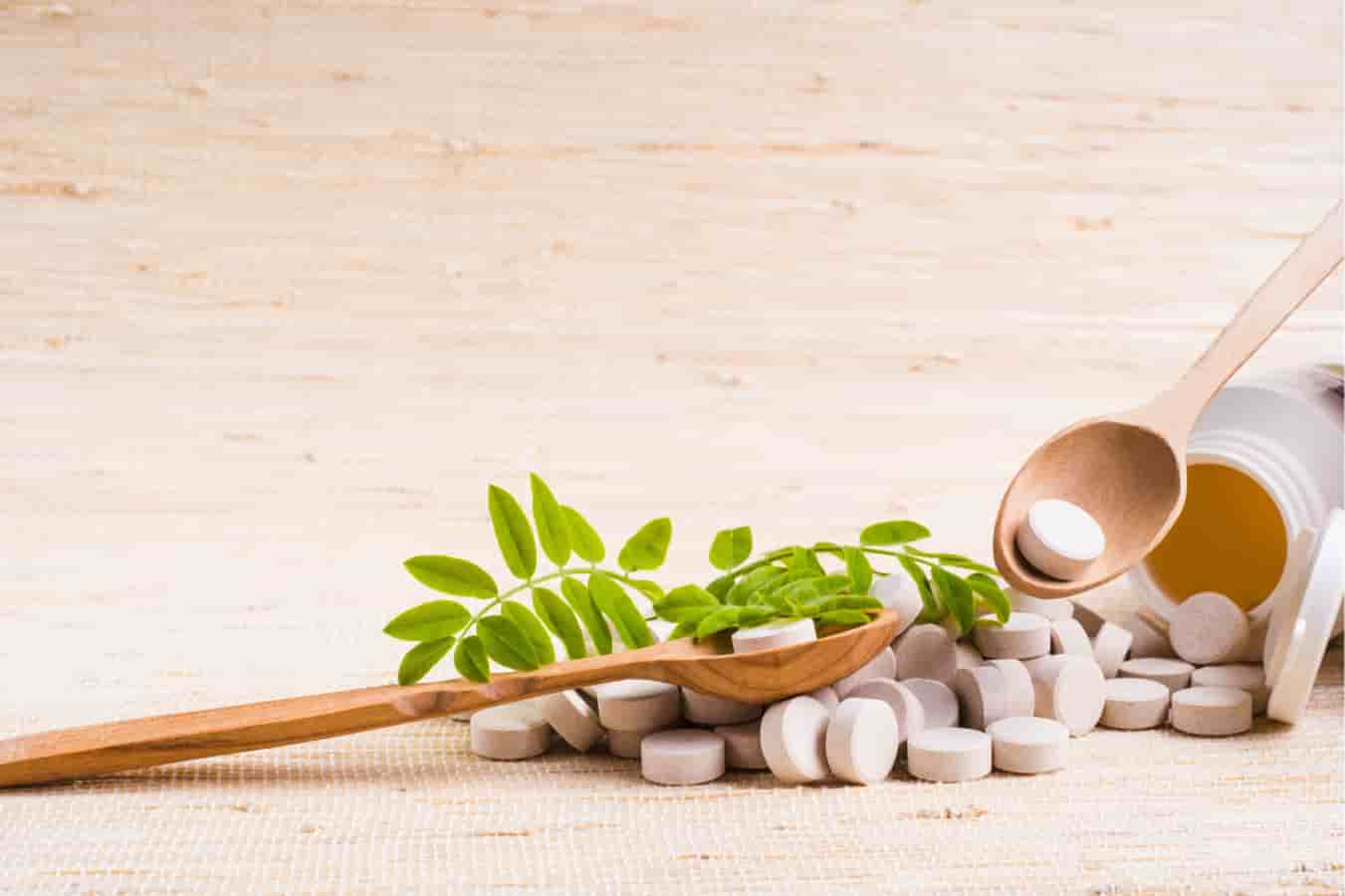
Why you can trust us
Articles on Natu.Care are written based on scientific research, data from government websites and other reliable sources. The texts are written in cooperation with doctors, nutritionists and other health and beauty experts. Articles are reviewed before publication and during significant updates.
.Learn more about our editorial process
.Information about advertisements
Content on Natu.Care may contain links to products from the sale of which we may receive a commission. When creating content, we adhere to high editorial standards and take care to be objective about the products discussed. The presence of affiliate links is not dictated by our partners, and we select the products we review ourselves completely independently.
.Learn more about our terms and Conditions
.Coenzyme Q10 is a vitamin-like compound found in the body. It affects heart health, blood pressure and prevents cancer. Don't tear yourself away from this article and learn more about this substance!
Coenzyme Q10 is a vitamin-like compound found in the body. It affects heart health, blood pressure and prevents cancer. Don't tear yourself away from this article and learn more about this substance!
The following article will help you learn more about this substance.
Coenzyme Q10 is also known as vitamin Q. It is essential for the function of every cell in the body. Despite this, it is unfamiliar to most people. Our expert pharmacist Magdalena Ciura confirms this. Unfortunately, coenzyme Q10 is no longer "fashionable" - its sales have fallen. Patients are being induced to take coenzyme Q10 by ill health and worse moods. Together with the expert, I have prepared the most important information about coenzyme Q10 for you!
Description of contents:
.- What is coenzyme Q10? .
- Properties of coenzyme Q10 .
- In what forms is coenzyme Q10 found? .
- Who should take coenzyme Q10?
- In which products is coenzyme Q10 found?
- Deficiency of coenzyme Q10 .
- Excess coenzyme Q10 .
- Supplementation of coenzyme Q10 .
- Can coenzyme Q10 be taken during pregnancy .
- Interactions of coenzyme Q10 with medications .
- Summary .
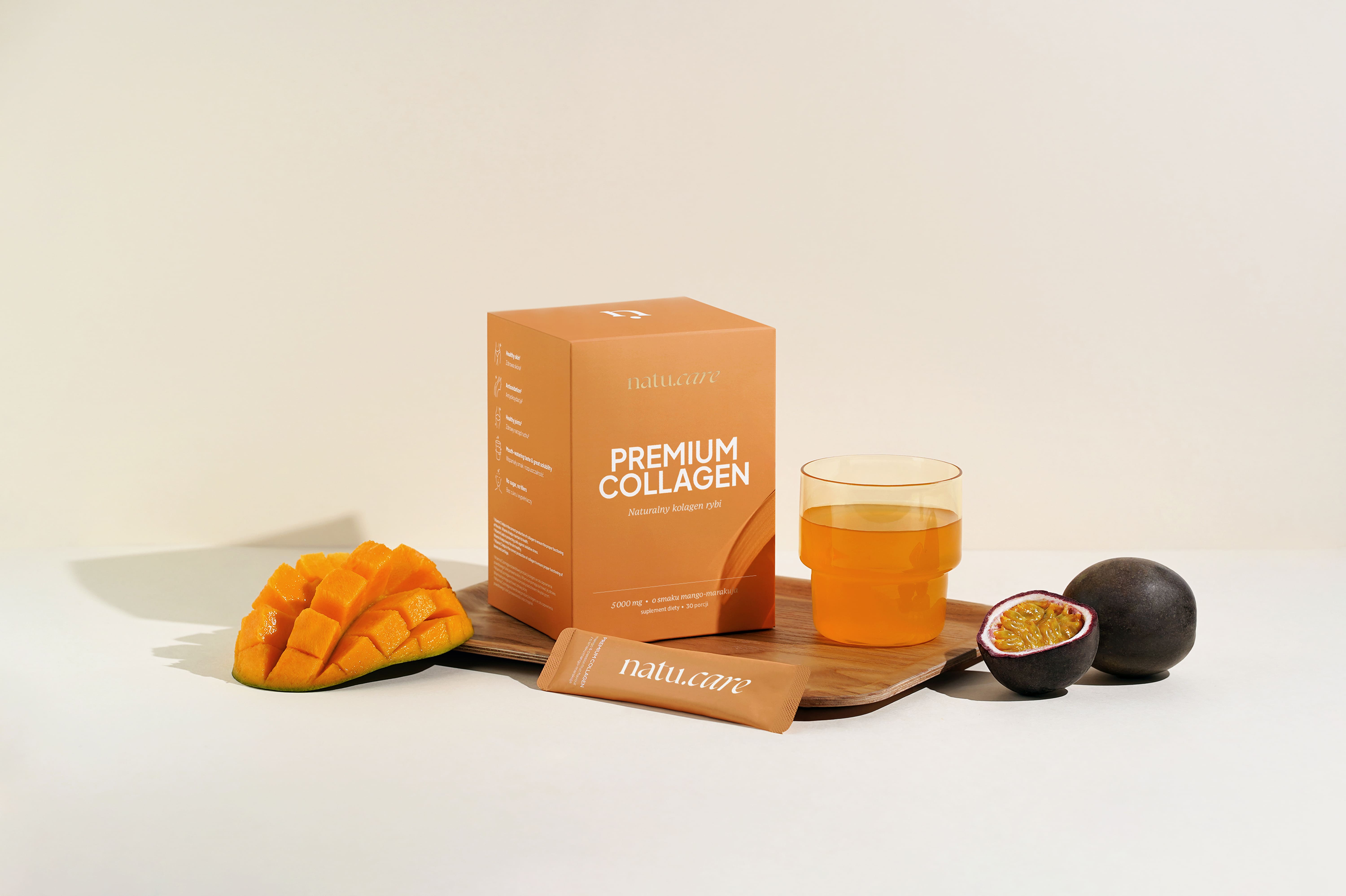
Sprawdź, za co pokochały go tysiące klientek Kolagen Premium 5000 mg, mango-marakuja
Natu.Care Kolagen Premium 5000 mg, mango-marakuja
Natu.Care Kolagen Premium dla zdrowia stawów, skóry, paznokci i włosów. Najlepsza przyswajalność. Optymalna dawka 5 000 lub 10 000 mg. Przebadany przez niezależne laboratorium.
Zobacz więcej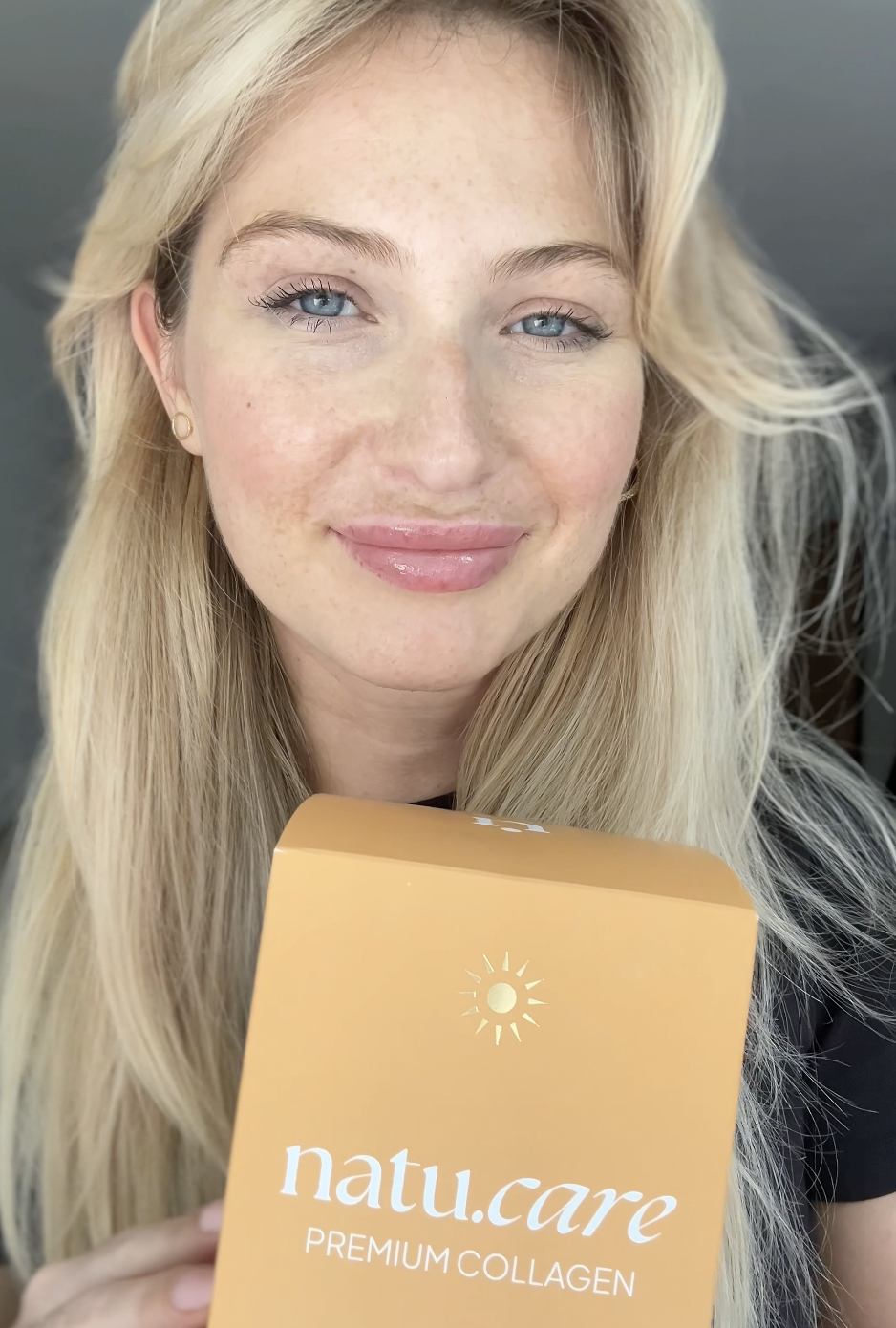
Wybrałam kolagen Natu.Care, ponieważ miał super opinie – a to było dla mnie bardzo ważne! Odkąd go stosuję, moja skóra znacznie się poprawiła i jest nawilżona, a na głowie pojawiły się nowe "baby hair".@Kasia S.
See also:
- BBBCream [ranking + reviews] .
- Cerave face creams [products + expert review] .
- Eye cream [ranking + how to choose]
- Anti-wrinkle cream [ranking + how to choose]
- Nail conditioners [ranking + expert opinion]
- Hand cream [ranking + expert opinion] .
What is coenzyme Q10?
.
Coenzyme Q10 is a nutrient naturally produced by the body. This powerful antioxidant* takes care of the heart, brain and musclesand. It is found in the mitochondria responsible for energy production. It influences this process and powers biochemical reactions. It has anti-inflammatory properties. As we age, the production of coenzyme Q10 decreasesand.
*a substance that protects the body against cancer
.
Properties of coenzyme Q10
.
The definition of coenzyme Q10 is not everything. It is its properties that are crucial to us. In what cases does it prove helpfuland?
Heart failure treatment
.
Heart failure is a consequence of coronary heart disease or high blood pressure . Studies have been carried out on 420 and 641 people in the treatment of these conditions with coenzyme Q10 . It has been proven to help reduce oxidative damage, restore optimal energy production and improve heart function.
Patients in the prevention of heart disease are recommended not only omega acids, but also the eponymous coenzyme Q10"..
 .
.
.
.Fertility enhancement
.
Coenzyme Q10 protects female eggs. Over time, the body is unable to protect them on its own protectionand. Our expert pharmacist explains: natural coenzyme production continues until the age of 30. Supplementation is helpful and reverses the destruction of egg cells. Male sperm are also subject to oxidative damage. Coenzyme Q10 improves sperm quality, activity and concentrationand.
Maintaining healthy skin
.
The skin is the largest organ in the human body. It is exposed to harmful external and internal factors. The use of coenzyme Q10 increases energy production in skin cells and has an antioxidant effect. It has been proven to reduce its damage and even the depth of wrinkles. What's more, people with adequate levels of coenzyme Q10 are less likely to suffer from skin cancerand.
Would you like to learn more about how to maintain healthy skin? Take a look at my article on collagen.
Climiting headaches
.
Malfunctioning mitochondria result in migraineand. Coenzyme Q10 improves their function - reducing inflammation during migraine. A study conducted on 1550 people found that treatment with coenzyme Q10 reduces headaches. This vitamin-like substance also works well as part of preventionand.
About 5 years ago I first came across a study claiming a reduction in migraine attacks during regular supplementation with coenzyme Q10. I happened to have a patient in the pharmacy at the time who had no idea how to deal with recurrent migraine attacks anymore. I recommended that she take coenzyme Q10. It worked! After 2 months of supplementation, the frequency of attacks decreased significantly..
 .
.
Cancer prevention
.
Oxidative stress leads to cell damageand. Coenzyme Q10 protects them and has a positive effect on cellular energy production. Insufficient levels of it are associated with a 53.3% higher risk of cancer. Furthermore, supplementation with this antioxidant can reduce the likelihood of recurrenceand.
How else does coenzyme Q10 work ?
- .
- Increases exercise performance. .
- Promotes the treatment and prevention of diabetes. .
- Provides positive effects on brain function. .
- Protects the lungs. .
Doctors have a very positive attitude towards coenzyme Q10. They recommend its supplementation when necessary. I have a good opinion of Coenzyme Q10. It reduces the feeling of fatigue, inhibits skin ageing processes and prevents periodontitis," says Magdalena Ciura.
.
In what forms is coenzyme Q10 present?
.
Coenzyme Q10 exists as ubiquinol and ubiquinoneand. Both are true forms of this antioxidant. However, ubiquinol is much easier absorbed and more effectiveand. More often than not, the inferior type of coenzyme Q10 is found in coenzyme Q10 supplements. Therefore, read product formulations carefully.
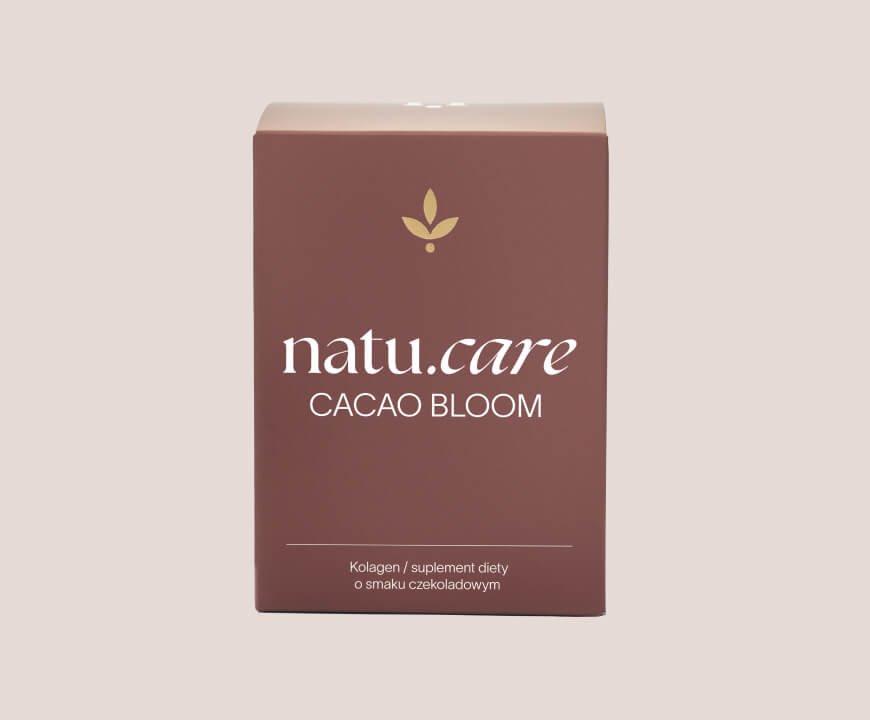
Cacao Bloom: premium collagen (5000 mg) with cocoa content
.Cacao Bloom is premium collagen (5000 mg) with Dutch cacao. A researched formulation, convenient dosage and unforgettable taste.
Who should take coenzyme Q10?
.
Our expert pharmacist answers. Coenzyme Q10 should be supplemented by people with:
- cardiac arrhythmias, .
- regular drops in energy, .
- prolonged fatigue, .
- reduced physical performance, .
Patients with heart arrhythmia and those taking statins (cholesterol-lowering drugs) should also take coenzyme Q10. It is also recommended during menopause and liver diseaseand.
Supplementation with coenzyme Q10 should also be considered by people exposed to prolonged stress, cigarette smokers, and people with unhealthy lifestyles..
 .
.
Note! Coenzyme Q10 supports the treatment of patients with COVID-19.
Product description
Coenzyme Q10 + vitamin E drops is a dietary supplement with strong antioxidant effects. The product prevents free radicals and thus supports the elimination of wrinkles and ageing.
Pros and cons
Coenzyme Q10 + vitamin E drops is a dietary supplement with strong antioxidant effects. The product prevents free radicals and thus supports the elimination of wrinkles and ageing.
Additional information
Coenzyme Q10 + vitamin E drops is a dietary supplement with strong antioxidant effects. The product prevents free radicals and thus supports the elimination of wrinkles and ageing.
Pharmovit, organic coenzyme Q10
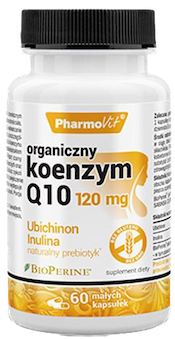
- Main ingredients: coenzyme Q10, piperine
- Form: capsules .
- Packaging: 60 capsules .
- Dose: 1 capsule per day .
- Sufficient for: 60 days .
Product description
Coenzyme Q10 has powerful antioxidant properties thatóprotect your cells from free radicals, which can support heart and vascular health, improve physical performance and slow down the ageing process. Coenzyme Q10 can support immune system function, nervous system health and improve skinóry.
Pros and cons
Coenzyme Q10 has powerful antioxidant properties thatóprotect your cells from free radicals, which can support heart and vascular health, improve physical performance and slow down the ageing process. Coenzyme Q10 can support immune system function, nervous system health and improve skinóry.
Additional information
Coenzyme Q10 has powerful antioxidant properties thatóprotect your cells from free radicals, which can support heart and vascular health, improve physical performance and slow down the ageing process. Coenzyme Q10 can support immune system function, nervous system health and improve skinóry.
Dr. Jacob's Q10 synergy, powder
Product description
Q10 Synergy contains high-quality, purest coenzyme Q10 (from Japan), riboflavin, taurine and L-carnitine. Synergy is a mutual enhancement of the effects of unique plant substances, vitamins and micronutrientsós.
Pros and cons
Q10 Synergy contains high-quality, purest coenzyme Q10 (from Japan), riboflavin, taurine and L-carnitine. Synergy is a mutual enhancement of the effects of unique plant substances, vitamins and micronutrientsós.
Additional information
Q10 Synergy contains high-quality, purest coenzyme Q10 (from Japan), riboflavin, taurine and L-carnitine. Synergy is a mutual enhancement of the effects of unique plant substances, vitamins and micronutrientsós.
Q10 Synergy contains high-quality, purest coenzyme Q10 (from Japan), riboflavin, taurine and L-carnitine. Synergy is a mutual enhancement of the effects of unique plant substances, vitamins and micronutrientsós.
{ product:7wbbYMdFBNShPpKryvr8wR }}
In which products is coenzyme Q10 found?
.
Coenzyme Q10 deficiency is most easily and effectively treated with supplementation. Nevertheless, it can be found in foodsand. Which ones
- Some types of meat: beef, pork, chicken.
- Pulses: lentils, soya beans and peanuts.
- Pulses: lentils, soya beans and peanuts.
- Fatty fish: herring, trout, mackerel and sardines.
- Poultry: heart, liver and kidney.
- Vegetables: spinach, broccoli and cauliflower. .
- Nuts and seeds: sesame and pistachios.
- Fruits: strawberries and oranges.
Coenzyme Q10 deficiency
.
Coenzyme Q10 deficiency is dangerous for everyone. This vitamin-like substance plays a key role in the body's health. The elderly are particularly at risk of its deficiency. Factors such as stress, lack of physical activity or an unhealthy diet also negatively affect coenzyme Q10 levelsand.
Inherent coenzyme Q10 deficiency
.
Some people struggle with the condition of congenital coenzyme Q10 deficiency. This is caused by damage to the genes responsible for its productionand. The disease manifests as cerebellar atrophy and progressive ataxia while still in childhood. Patients with this condition are usually treated with high doses of coenzyme Q10 .
Effects of deficiency - what will we experience when we run out of coenzyme Q10?
.
Lack of energy, low immunity, heart disorders and infections - says Magdalena Ciura. These are some of the more troublesome effects of coenzyme Q10 deficiency. Its lack also affects a decrease in physical vigour. Furthermore, a coenzyme Q10 deficiency negatively affects the skin and causes headachesand.
Excess coenzyme Q10
.
Most people can tolerate coenzyme Q10 in doses exceeding even 1000 mg per day . However, everything has its healthy limits, as confirmed by an expert. Excess coenzyme Q10 leads to gastrointestinal disorders, neurological disorders and headaches. It also causes nausea and skin rashesand.
Supplementation of coenzyme Q10
.
You already know, that the body only produces coenzyme Q10 up to a certain point. This is why supplementation is essential in many cases. Find out what you need to know about it!
How long to take to see effects?
.
It takes between 5 and 8 hours for coenzyme Q10 to reach the blood from the stomach. Despite this, it takes much longer to see its effects. The benefits in terms of migraine prevention will appear after about 3 months of use. In contrast, coenzyme Q10 supplementation to lower blood pressure needs to last from 4 to 12 weeks.
What is the daily requirement for coenzyme Q10?
.
The best daily dose of coenzyme Q10 has not been established. Studies have used a range of 50 to 1,200 mg and no adverse effects have been seen even at the upper dose limit. A safe amount is 100-200 mg per day. Remember to follow the supplement manufacturer's recommendations. If you are in doubt about the correct dosage - seek specialist advice.
When to take coenzyme Q10 - morning or evening?
.
The pharmacist answers briefly: coenzyme Q10 is best taken in the morning with or shortly after a meal. The mineral is fat-soluble. Therefore, it is advisable to take it after a meal that is rich in it. This positively affects the absorption of coenzyme Q10 - your body will use it more effectively.
Coenzyme Q10 - contraindications
.
The only contraindication to coenzyme Q10 supplementation is if you suffer from blood hypotension. This substance lowers blood pressure, so by taking coenzyme Q10 with already existing hypotension, you may exacerbate symptoms such as dizziness, weakness, cold feelings, and pale skin.
Can supplementation replace a balanced diet?.
Many people try to replace a balanced diet with numerous supplements. What was the response of our specialist pharmacist when asked if this works? A proper diet is the basis. Only its combination with supplements can bring the expected effect. So remember that supplements are only a supplement to the diet.
Does your pharmacist recommend coenzyme Q10 supplementation?
.
Coenzyme Q10 supplementation is chosen by a handful of people. Does a pharmacist recommend it? Yes, I would recommend coenzyme Q10 supplementation. Especially if the patient is experiencing lack of energy, heart disorders and has a reduced immune system. It is particularly recommended for people with recurrent inflammation and parodontosis. There is no alternative supplementation for these conditions.
Can coenzyme Q10 be taken during pregnancy?
.
A study on 235 women showed that taking coenzyme Q10 during pregnancy reduces the risk of pre-eclampsia. Our expert also speaks positively on the subject: Coenzyme Q10 can be supplemented during pregnancy. However, she adds: it is a vitamin-based preparation, so prior consultation with a doctor is necessary.
Coenzyme Q10 and breastfeeding women
.
Coenzyme Q10 does not affect lactation. Supplements with it are well tolerated and side effects are rare. What is the opinion of our expert pharmacist? Coenzyme Q10 can be taken while breastfeeding. However, a green light from your doctor is required before starting supplementation.
.
Interactions of coenzyme Q10 with medicines
.
Coenzyme Q10 may interact with medications. People taking agents lowering blood pressure should be particularly careful. Coenzyme Q10 can also react with drugs used during chemotherapy. If you are taking these or other medications - please consult a specialist before starting supplementation.
See also:
- Drinking collagen [properties + ranking] .
- Facial collagen [effects + ranking]
- Collagen for skin [ranking] .
- Collagen for joints [effects + forms] .
- Collagen for wrinkles [ranking] .
- Most powerful collagen [ranking + types] .
Summary
.
Collagen Q10 no longer holds any secrets from you. Remember:
- Coenzyme Q10 influences heart health, blood pressure and prevents cancer.
- Coenzyme Q10 has a positive effect on heart health, blood pressure and cancer prevention.
- Specialists speak favourably of coenzyme Q10.
- The coenzyme Q10 is a good supplement.
- In the greatest quantities, coenzyme Q10 is found in offal, such as heart, liver and kidney.
- Coenzyme Q10 deficiency is influenced by age, physical inactivity and stress. .
- Excessive coenzyme Q10 deficiency is very rare. .
- Pregnant and breastfeeding women can take coenzyme Q10 after consulting their doctor.
- Pregnant women can take coenzyme Q10 after consulting their doctor.
- Coenzyme Q10 may react with high blood pressure medications and those used during chemotherapy. .
FAQ
.Which coenzyme Q10 to choose?
.Coenzyme Q10 comes in two forms - ubiquinone and ubiquinol. Both forms have similar properties, but ubiquinol is the active, reduced form considered to be better absorbed by the body. Ultimately, the choice depends on individual preference and the needs of the body.
How long to use coenzyme Q10?
.The first effects of use will be visible after several days, and the length of supplementation should be decided by your doctor. Supplementation with coenzyme Q10 is extremely important in, among other things, liver and heart disorders, as well as in autoimmune diseases such as Hashimoto's. Studies have shown that regular use of coenzyme Q10 for at least three months can benefit heart, cardiovascular and inflammatory health.
How does coenzyme Q10 work on the face?
.Coenzyme Q10 is a powerful antioxidant that helps protect the skin from oxidative stress. Coenzyme Q10 also works at a cellular level to promote tissue regeneration. It can help prevent sun damage and ageing, improve the appearance of the skin and reduce the appearance of wrinkles and fine lines. Because of these properties, coenzyme Q10 is often used in cosmetics and antiageing creams - often in the company of vitamin C, vitamin E or hyaluronic acid.
Does coenzyme Q10 aid weight loss?
.Research confirms that coenzyme Q10 can affect weight loss, although it is not directly associated with it. It improves metabolism at the cellular and extracellular level. At the same time, it stimulates the body to use the resources provided and accelerates fat burning. Supplementation alone will not produce weight loss effects.
Does coenzyme Q10 raise blood pressure?
.There is no evidence to suggest that coenzyme Q10 increases blood pressure. Studies have shown that coenzyme Q10 supplementation can lower blood pressure in people with hypertension. Coenzyme Q10 helps to dilate blood vessels, which may help to lower blood pressure.
Does coenzyme Q10 lower cholesterol?
.Research suggests that coenzyme Q10 supplementation may have a beneficial effect on blood lipid levels, particularly triglyceride levels, and may help lower LDL, or so-called bad cholesterol. The coenzyme increases cell metabolism and improves the heart's tolerance to exercise. It prevents the formation of dangerous clots in the arteries and reduces the risk of high blood pressure.
Is it possible to measure coenzyme Q10 levels in the body and how much does the test cost?
.Measuring coenzyme Q10 levels is a blood test that will help determine the amount of coenzyme Q10 in the body. It is recommended for people taking statins (cholesterol-lowering drugs), people during and after chemotherapy, fibromyalgia patients and anyone with a suspected deficiency, among others. The cost of testing coenzyme Q10 levels depends on the specific diagnostic laboratory, with prices starting at around £150.
..
Resources
.See all
.Ben-Meir, A., Burstein, E., Borrego-Alvarez, A., Chong, J., Wong, E., Yavorska, T., Naranian, T., Chi, M., Wang, Y., Bentov, Y., Alexis, J., Meriano, J., Sung, H.-K., Gasser, D. L., Moley, K. H., Hekimi, S., Casper, R. F., & Jurisicova, A. (2015). Coenzyme Q10 restores oocyte mitochondrial function and fertility during reproductive aging. Aging Cell, 14(5), 887-895. https://doi.org/10.1111/acel.12368
Cooke, M., Iosia, M., Buford, T., Shelmadine, B., Hudson, G., Kerksick, C., Rasmussen, C., Greenwood, M., Leutholtz, B., Willoughby, D., & Kreider, R. (2008). Effects of acute and 14-day coenzyme Q10 supplementation on exercise performance in both trained and untrained individuals. Journal of the International Society of Sports Nutrition, 5(1), 8. https://doi.org/10.1186/1550-2783-5-8
Deichmann, R., Lavie, C., & Andrews, S. (2010). Coenzyme Q10 and Statin-Induced Mitochondrial Dysfunction. The Ochsner Journal, 10(1), 16-21.
DiNicolantonio, J. J., Bhutani, J., McCarty, M. F., & O'Keefe, J. H. (2015). Coenzyme Q10 for the treatment of heart failure: A review of the literature. Open Heart, 2(1), e000326. https://doi.org/10.1136/openhrt-2015-000326
Farsi, F., Mohammadshahi, M., Alavinejad, P., Rezazadeh, A., Zarei, M., & Engali, K. A. (2016). Functions of Coenzyme Q10 Supplementation on Liver Enzymes, Markers of Systemic Inflammation, and Adipokines in Patients Affected by Nonalcoholic Fatty Liver Disease: A Double-Blind, Placebo-Controlled, Randomized Clinical Trial. Journal of the American College of Nutrition, 35(4), 346-353. https://doi.org/10.1080/07315724.2015.1021057
Folkers, K. (1996). Relevance of the biosynthesis of coenzyme Q10 and of the four bases of DNA as a rationale for the molecular causes of cancer and a therapy. Biochemical and Biophysical Research Communications, 224(2), 358-361. https://doi.org/10.1006/bbrc.1996.1033
Folkers, K., Osterborg, A., Nylander, M., Morita, M., & Mellstedt, H. (1997). Activities of vitamin Q10 in animal models and a serious deficiency in patients with cancer. Biochemical and Biophysical Research Communications, 234(2), 296-299. https://doi.org/10.1006/bbrc.1997.6522
Gökbel, H., Gül, I., Belviranl, M., & Okudan, N. (2010). The effects of coenzyme Q10 supplementation on performance during repeated bouts of supramaximal exercise in sedentary men. Journal of Strength and Conditioning Research, 24(1), 97-102. https://doi.org/10.1519/JSC.0b013e3181a61a50
Gupta, R. K., Patel, A. K., Shah, N., Chaudhary, A. K., Jha, U. K., Yadav, U. C., Gupta, P. K., & Pakuwal, U. (2014). Oxidative stress and antioxidants in disease and cancer: A review. Asian Pacific Journal of Cancer Prevention: APJCP, 15(11), 4405-4409. https://doi.org/10.7314/apjcp.2014.15.11.4405
Gutierrez-Mariscal, F. M., Arenas-de Larriva, A. P., Limia-Perez, L., Romero-Cabrera, J. L., Yubero-Serrano, E. M., & López-Miranda, J. (2020). Coenzyme Q10 Supplementation for the Reduction of Oxidative Stress: Clinical Implications in the Treatment of Chronic Diseases. International Journal of Molecular Sciences, 21(21), 7870. https://doi.org/10.3390/ijms21217870
Gvozdjáková, A., Kucharská, J., Bartkovjaková, M., Gazdíková, K., & Gazdík, F. E. (2005). Coenzyme Q10 supplementation reduces corticosteroids dosage in patients with bronchial asthma. BioFactors (Oxford, England), 25(1-4), 235-240. https://doi.org/10.1002/biof.5520250129
Hargreaves, I. R., & Mantle, D. (2021). COVID-19, Coenzyme Q10 and Selenium. Advances in Experimental Medicine and Biology, 1327, 161-168. https://doi.org/10.1007/978-3-030-71697-4_13
Hershey, A. D., Powers, S. W., Vockell, A.-L. B., Lecates, S. L., Ellinor, P. L., Segers, A., Burdine, D., Manning, P., & Kabbouche, M. A. (2007). Coenzyme Q10 deficiency and response to supplementation in pediatric and adolescent migraine. Headache, 47(1), 73-80. https://doi.org/10.1111/j.1526-4610.2007.00652.x
Hoppe, U., Bergemann, J., Diembeck, W., Ennen, J., Gohla, S., Harris, I., Jacob, J., Kielholz, J., Mei, W., Pollet, D., Schachtschabel, D., Sauermann, G., Schreiner, V., Stäb, F., & Steckel, F. (1999). Coenzyme Q10, a cutaneous antioxidant and energizer. BioFactors (Oxford, England), 9(2-4), 371-378. https://doi.org/10.1002/biof.5520090238
Knott, A., Achterberg, V., Smuda, C., Mielke, H., Sperling, G., Dunckelmann, K., Vogelsang, A., Krüger, A., Schwengler, H., Behtash, M., Kristof, S., Diekmann, H., Eisenberg, T., Berroth, A., Hildebrand, J., Siegner, R., Winnefeld, M., Teuber, F., Fey, S., ... Blatt, T. (2015). Topical treatment with coenzyme Q10-containing formulas improves skin's Q10 level and provides antioxidative effects. Biofactors (Oxford, England), 41(6), 383-390. https://doi.org/10.1002/biof.1239
Kubo, H., Fujii, K., Kawabe, T., Matsumoto, S., Kishida, H., & Hosoe, K. (2008). Food content of ubiquinol-10 and ubiquinone-10 in the Japanese diet. Journal of Food Composition and Analysis, 21(3), 199-210. https://doi.org/10.1016/j.jfca.2007.10.003
Lafuente, R., González-Comadrán, M., Solà, I., López, G., Brassesco, M., Carreras, R., & Checa, M. A. (2013). Coenzyme Q10 and male infertility: A meta-analysis. Journal of Assisted Reproduction and Genetics, 30(9), 1147-1156. https://doi.org/10.1007/s10815-013-0047-5
Laplante, S., Souchet, N., & Bryl, P. (2009). Comparison of low-temperature processes for oil and coenzyme Q10 extraction from mackerel and herring. European Journal of Lipid Science and Technology, 111(2), 135-141. https://doi.org/10.1002/ejlt.200800133
Morisco, C., Trimarco, B., & Condorelli, M. (1993). Effect of coenzyme Q10 therapy in patients with congestive heart failure: A long-term multicenter randomized study. The Clinical Investigator, 71(8 Suppl), S134-136. https://doi.org/10.1007/BF00226854
Mortensen, S. A., Rosenfeldt, F., Kumar, A., Dolliner, P., Filipiak, K. J., Pella, D., Alehagen, U., Steurer, G., Littarru, G. P., & Q-SYMBIO Study Investigators. (2014). The effect of coenzyme Q10 on morbidity and mortality in chronic heart failure: Results from Q-SYMBIO: a randomised double-blind trial. JACC. Heart Failure, 2(6), 641-649. https://doi.org/10.1016/j.jchf.2014.06.008
Palan, P. R., Connell, K., Ramirez, E., Inegbenijie, C., Gavara, R. Y., Ouseph, J. A., & Mikhail, M. S. (2005). Effects of menopause and hormone replacement therapy on serum levels of coenzyme Q10 and other lipid-soluble antioxidants. BioFactors (Oxford, England), 25(1-4), 61-66. https://doi.org/10.1002/biof.5520250107
Passi, S., Cataudella, S., Di Marco, P., De Simone, F., & Rastrelli, L. (2002). Fatty acid composition and antioxidant levels in muscle tissue of different Mediterranean marine species of fish and shellfish. Journal of Agricultural and Food Chemistry, 50(25), 7314-7322. https://doi.org/10.1021/jf020451y
..
Editorials
Meet the team

Master of Pharmacy
Łukasz Borula holds a Master of Pharmacy degree from the Faculty of Pharmacy at the Jagiellonian University CM in Krakow. Since 2014, he has been gaining experience as a pharmacist in various pharmacies, all over Poland. His hobby is educating people on his profile on Instagram: @szczeryfarmaceuta

Editor
Graduate of Journalism and Artes Liberales at the University of Warsaw. Since 2017, he has been working with the biggest portals in Poland and abroad as an editor. Previously worked for 3 years in one of the leading pharmaceutical companies - he knows the health and beauty industry inside out. In his free time, he most enjoys playing tennis or skiing.
![Vitamin B12 - where it occurs in the diet and in products [table].](https://cdn-resources.natu.care/uploads/1/balanced_diet_nutrition_healthy_eating_concept_food_sources_rich_vitamin_b12_cobalamin_kitchen_table_1_b84f75bda2.jpg)
Find out where vitamin B12 is found and which products will provide you with it.

Vitamin PP also known as niacin or vitamin B3 supports the proper functioning of the body.
![What is NMN? Effects, effects, side effects [supplements].](https://cdn-resources.natu.care/uploads/1/science_background_with_molecule_atom_abstract_structure_science_medical_background_3d_illustration_1_a5ec4d9cec.jpg)
Everything you want to know about NMN: properties, effects, safety and expert opinions.
